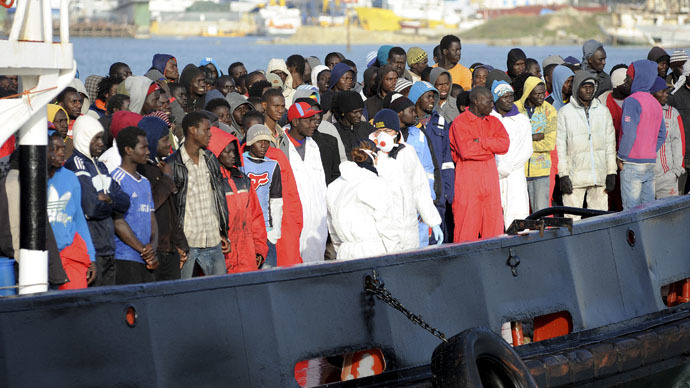‘Europe must support refugees & rescue them from Mediterranean’

While officials are blaming criminal gangs for the Mediterranean migrant disaster, it is actually about desperate and vulnerable refugees fleeing war-ravaged countries, who must be helped and not rejected, Stephen Hale, CEO of Refugee Action, told RT.
READ MORE: Over 800 migrants dead in Libya shipwreck disaster – UN
The UN refugee agency has confirmed that more than 800 people are likely to
have drowned following the disaster off the coast of Libya.
People from Africa and the Middle East are believed to have made
a desperate attempt to leave from the war-torn Libyan capital
Tripoli with the help of smugglers operating a trawler. The ship
capsized after a Portuguese merchant ship approached the vessel,
causing a stampede.
The EU has come under mounting criticism for failing to tackle
the worsening refugee crisis in the Mediterranean.
RT:First of all, how bad is the situation
in the migrants’ home countries that’s driving them to do this?
Is it really that desperate?
Stephen Hale: Well, as you can imagine nobody
flees their home country and their possessions and their family
and their friends unless they are truly desperate. And the vast
majority of the people who are crossing right now in the
Mediterranean are from Libya, they’re from Syria, they’re from
Eritrea. Countries where there are very high levels of violence
or conflict and also grave human rights abuses in the case of
Eritrea. So these are desperate people with really no choice but
to flee their countries, which they have been born and grown up
in.
RT:There has been comment from the UN human
rights chief saying that Europe is turning its back on some of
the most vulnerable people in the world and risk turning the
Mediterranean into a vast cemetery. Do you agree with that?
SH: I am very sorry to say that I do agree with
that. In October last year, seven months ago, all European
governments agreed to stop the search and rescue system, which
was giving people the opportunity to be rescued in the
Mediterranean and they did that because they said, “if we remove
this service, this search and rescue, this humanitarian service…
then [they] will stop making this journey,” and that clearly has
proven to be totally false and the tragic events of the last week
show that unless we bring back that search and rescue scheme
hundreds and thousands of people are going to die. It’s like a
death sentence, which Europe is imposing on these desperate
people who are fleeing these countries in the Middle East.
READ MORE: EU under fire over migrant crisis after deadly boat capsize
RT:Seventy percent of migrants are still
thought to be able to get across to Europe. What fate awaits them
then? Do some of them get asylum or are they sent straight back
again?
SH: Well every case should be considered on its
merits. There is a UN human rights Convention and every person
should be assessed and obviously if they are at real risk of
persecution, they will receive asylum and they will receive
support. So I can’t vouch for that approach, it varies between
different countries, but that is certainly what should be
happening and we at Refugee Action are trying to ensure that all
governments meet their responsibilities, and we get a system,
which is shaped by compassion and give these people the support
they deserve.
RT:It would be tough to blame Italy,
because it is always in the news, and Italy has put a lot of
money and a lot of effort into it up until last year. Surely it
has to be a whole European effort trying to stem this tide. But
how is that going to work for the British side, when UK Home
Secretary Theresa May basically said that this crisis was down to
human traffickers, not due to the instability brought in Libya in
2011?
SH: Well of course if you are in this situation,
if you are having to flee persecution or conflict, if your life
is in danger, then you are vulnerable and you have no choice but
to go with these trafficking gangs. But the cause of this crisis
from which people are fleeing and the solution clearly is not
simply to look at the gangs but to find how we can give people
the support and the safety they need. Because it is absolutely
clear, since the search and rescue operations were stopped in
October, people will continue to cross the Mediterranean Sea and
they need a solution and we need to be trying to find solutions
to these conflicts. We need to support people when they arrive,
and we need to rescue them from the Mediterranean Sea.
MORE:
The statements, views and opinions expressed in this column are solely those of the author and do not necessarily represent those of RT.












